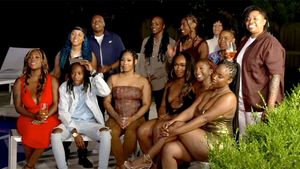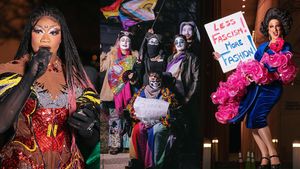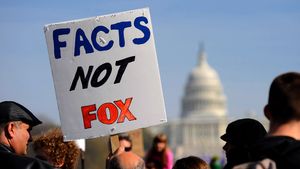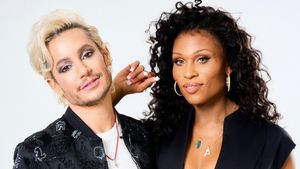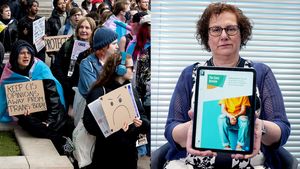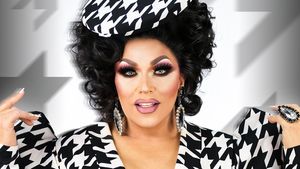I now have had ample time to recover—from both shock and in awe—from the Supreme Courts historic decisions announced in the final week of June.
My awe moment is Wednesday, June 26. It was a great day for me as a lesbian American. Historic decisions in both Windsor v. United States and Hollingsworth v. Perry were announced. Not only was DOMA finally struck down, but, so too, the anti-gay proponents of Proposition 8.
In a 5–4 decision the progressive and moderate justices of the Supreme Court ruled Section 3 of DOMA to be unconstitutional, declaring it as "a deprivation of the liberty of the person protected by the Fifth Amendment." Finally, all same-gender married couples will be afforded the same 1,000-plus federal protections and benefits as opposite-gender couples.
The proponents of Prop 8 were finally told to cease and desist, meaning they no longer have legally a homophobic leg to stand on in terms of their anti-gay and obstructionist antics to appeal lower court rulings. California same-gender couples no longer have to do an anxious and cautious walk to the altar worrying about state rulings yo-yoing them around.
My shock moments came on Monday, June 24 and Tuesday, June 25…
On Monday, the Court, in a surprising 7-1 ruling, sidestepped the hot-button issue of race in America by throwing the Fisher v. University of Texas back to the lower courts for reconsideration.
The present day argument against employing race-conscious admission policies as a pedagogical benefit for diversity is being usurped, at least in Texas, with debates that class-conscious admission policies would best achieve racial diversity. The Texas Top Ten Percent Plan purports to accept 10 percent of all high school graduating class to their universities. This policy works well so alleges the state. But Texas omits telling you why: their neighborhoods and high schools are as unabashedly segregated in 2013 as they were in 1954 when the historic Supreme Court Brown vs. Board of Ed. ruling, deemed segregated schools unconstitutional.
On Tuesday, the Court delivered another hard blow. In a 5-4 vote from a glaringly ideologically divided court, the lifeline and heart and soul of the historic 1965 Voting Rights Act was gutted.
The Court ruled that Section 4 of the VRA is outdated. Section 4 historically protected African Americans and other disenfranchised people of color. The ruling contests a fictive post-racial premise that racial minorities, especially in the South, no longer confront discriminatory barriers voting. At the time, the 1965 VRA applied to nine states in South—Alabama, Alaska, Arizona, Georgia, Louisiana, Mississippi, South Carolina, Texas and Virginia.
But voter suppression is alive and well today.
Just last year, Florida deliberately reduced days available for early voting, making it difficulty for voters to cast their ballots who relocated to different counties within the state.
And in Maryland, the 2010 gubernatorial Republican candidate Bob Ehrlich "hired a consultant who advised that 'the first and most desired outcome is voter suppression,' in the form of having "African-American voters stay home.'"
As a member of one of the early generations to benefit from the gains of the African American civil rights movement of the last century, these rulings hit hard. Many of us in the
LGBTQ community are outraged. But a GLAD board member and beloved ally to Greater Boston knows the reality of voter suppression first hand.
"This ruling was an enormous setback for the hard fought for civil rights gains of the past. My home state of Alabama is one of those states that continues to try and block voting access, but those efforts has been substantially hampered by the provisions contained in the VRA," Jo Davis wrote in an email blast.
While many of us would like to think voter suppression only happens in the South, let me disabuse you of the notion with the scores of counties and municipalities in the North, like NYC, the Bronx and my borough of Brooklyn that was also covered in the 1965 VRA, and will now be greatly impacted.
If the Court thinks the VRA is outdated it only needs to read Huffington Post blogger Judith Brown Dianis’ “Top 10 Voter Suppression Moments of 2012” that overwhelming affected people of color.
The Supreme Court rulings force LGBTQ people of color, like myself, to reside a bifurcated reality in terms of full civil rights protections.
With advances such as hate crime laws, the repeal of the military’s DADT, the legalization of same-sex marriage in many states, DOMA struck down, Prop. 8 overturned, and with homophobia viewed as a national concern, the LGBTQ movement has come a long way since the first Pride marches four plus decades ago. Many note the perceived distance the LGBTQ community has traveled in such a short historic time—from a disenfranchised group on the fringe of America’s mainstream to a community now on the verge of full equality. But not all members of our community have crossed the finish line.
Will the LGBTQ community help those of us, like me, left behind?
Like Us on Facebook
Follow Us on Twitter
























































































